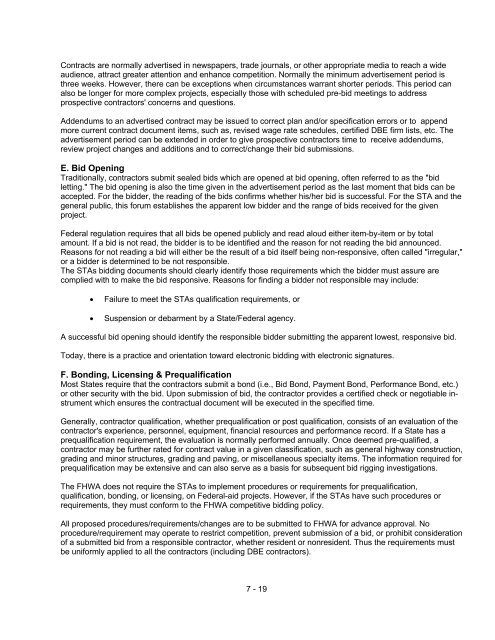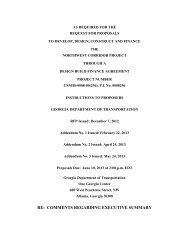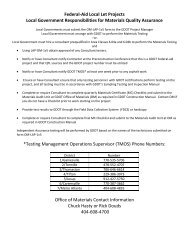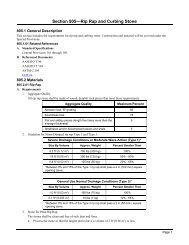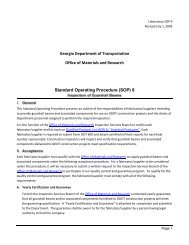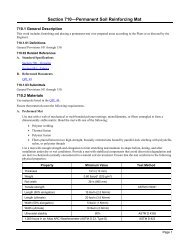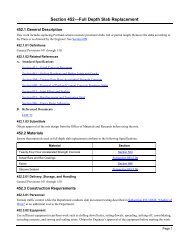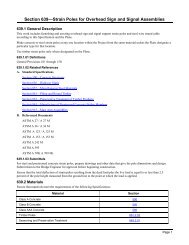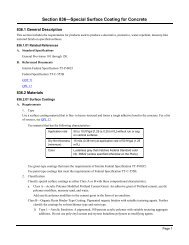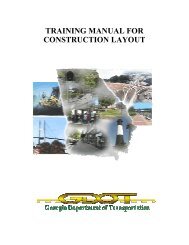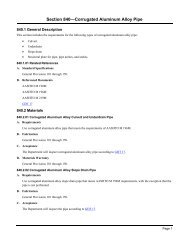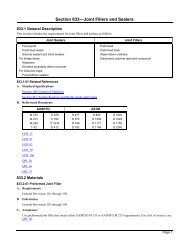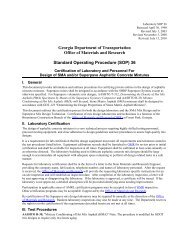TITLE VI HANDBOOK - Department of Transportation
TITLE VI HANDBOOK - Department of Transportation
TITLE VI HANDBOOK - Department of Transportation
You also want an ePaper? Increase the reach of your titles
YUMPU automatically turns print PDFs into web optimized ePapers that Google loves.
Contracts are normally advertised in newspapers, trade journals, or other appropriate media to reach a wideaudience, attract greater attention and enhance competition. Normally the minimum advertisement period isthree weeks. However, there can be exceptions when circumstances warrant shorter periods. This period canalso be longer for more complex projects, especially those with scheduled pre-bid meetings to addressprospective contractors' concerns and questions.Addendums to an advertised contract may be issued to correct plan and/or specification errors or to appendmore current contract document items, such as, revised wage rate schedules, certified DBE firm lists, etc. Theadvertisement period can be extended in order to give prospective contractors time to receive addendums,review project changes and additions and to correct/change their bid submissions.E. Bid OpeningTraditionally, contractors submit sealed bids which are opened at bid opening, <strong>of</strong>ten referred to as the "bidletting." The bid opening is also the time given in the advertisement period as the last moment that bids can beaccepted. For the bidder, the reading <strong>of</strong> the bids confirms whether his/her bid is successful. For the STA and thegeneral public, this forum establishes the apparent low bidder and the range <strong>of</strong> bids received for the givenproject.Federal regulation requires that all bids be opened publicly and read aloud either item-by-item or by totalamount. If a bid is not read, the bidder is to be identified and the reason for not reading the bid announced.Reasons for not reading a bid will either be the result <strong>of</strong> a bid itself being non-responsive, <strong>of</strong>ten called "irregular,"or a bidder is determined to be not responsible.The STAs bidding documents should clearly identify those requirements which the bidder must assure arecomplied with to make the bid responsive. Reasons for finding a bidder not responsible may include:• Failure to meet the STAs qualification requirements, or• Suspension or debarment by a State/Federal agency.A successful bid opening should identify the responsible bidder submitting the apparent lowest, responsive bid.Today, there is a practice and orientation toward electronic bidding with electronic signatures.F. Bonding, Licensing & PrequalificationMost States require that the contractors submit a bond (i.e., Bid Bond, Payment Bond, Performance Bond, etc.)or other security with the bid. Upon submission <strong>of</strong> bid, the contractor provides a certified check or negotiable instrumentwhich ensures the contractual document will be executed in the specified time.Generally, contractor qualification, whether prequalification or post qualification, consists <strong>of</strong> an evaluation <strong>of</strong> thecontractor's experience, personnel, equipment, financial resources and performance record. If a State has aprequalification requirement, the evaluation is normally performed annually. Once deemed pre-qualified, acontractor may be further rated for contract value in a given classification, such as general highway construction,grading and minor structures, grading and paving, or miscellaneous specialty items. The information required forprequalification may be extensive and can also serve as a basis for subsequent bid rigging investigations.The FHWA does not require the STAs to implement procedures or requirements for prequalification,qualification, bonding, or licensing, on Federal-aid projects. However, if the STAs have such procedures orrequirements, they must conform to the FHWA competitive bidding policy.All proposed procedures/requirements/changes are to be submitted to FHWA for advance approval. Noprocedure/requirement may operate to restrict competition, prevent submission <strong>of</strong> a bid, or prohibit consideration<strong>of</strong> a submitted bid from a responsible contractor, whether resident or nonresident. Thus the requirements mustbe uniformly applied to all the contractors (including DBE contractors).7 - 19


